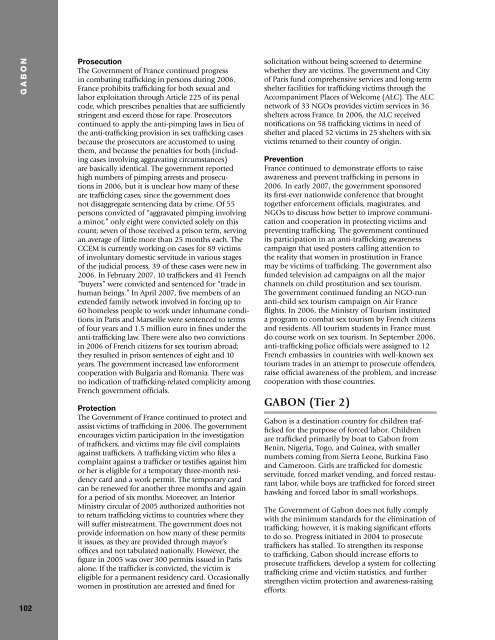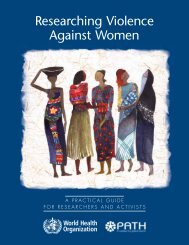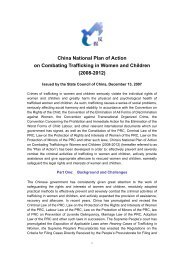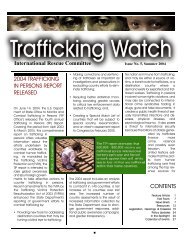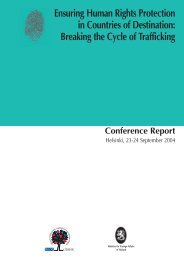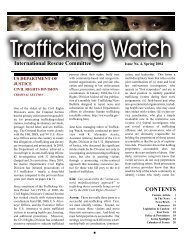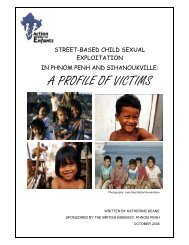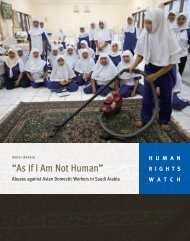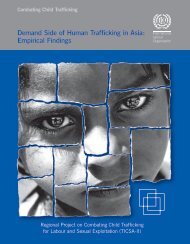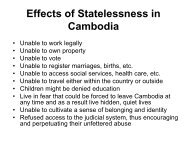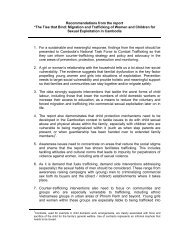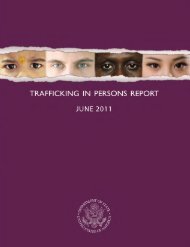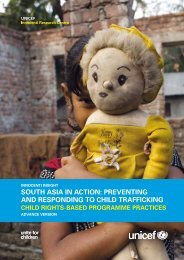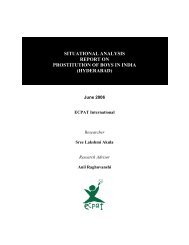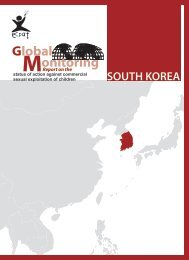2007 Trafficking in Persons Report - Center for Women Policy Studies
2007 Trafficking in Persons Report - Center for Women Policy Studies
2007 Trafficking in Persons Report - Center for Women Policy Studies
Create successful ePaper yourself
Turn your PDF publications into a flip-book with our unique Google optimized e-Paper software.
G A B O N<br />
102<br />
Prosecution<br />
The Government of France cont<strong>in</strong>ued progress<br />
<strong>in</strong> combat<strong>in</strong>g traffick<strong>in</strong>g <strong>in</strong> persons dur<strong>in</strong>g 2006.<br />
France prohibits traffick<strong>in</strong>g <strong>for</strong> both sexual and<br />
labor exploitation through Article 225 of its penal<br />
code, which prescribes penalties that are sufficiently<br />
str<strong>in</strong>gent and exceed those <strong>for</strong> rape. Prosecutors<br />
cont<strong>in</strong>ued to apply the anti-pimp<strong>in</strong>g laws <strong>in</strong> lieu of<br />
the anti-traffick<strong>in</strong>g provision <strong>in</strong> sex traffick<strong>in</strong>g cases<br />
because the prosecutors are accustomed to us<strong>in</strong>g<br />
them, and because the penalties <strong>for</strong> both (<strong>in</strong>clud<strong>in</strong>g<br />
cases <strong>in</strong>volv<strong>in</strong>g aggravat<strong>in</strong>g circumstances)<br />
are basically identical. The government reported<br />
high numbers of pimp<strong>in</strong>g arrests and prosecutions<br />
<strong>in</strong> 2006, but it is unclear how many of these<br />
are traffick<strong>in</strong>g cases, s<strong>in</strong>ce the government does<br />
not disaggregate sentenc<strong>in</strong>g data by crime. Of 55<br />
persons convicted of “aggravated pimp<strong>in</strong>g <strong>in</strong>volv<strong>in</strong>g<br />
a m<strong>in</strong>or,” only eight were convicted solely on this<br />
count; seven of those received a prison term, serv<strong>in</strong>g<br />
an average of little more than 25 months each. The<br />
CCEM is currently work<strong>in</strong>g on cases <strong>for</strong> 89 victims<br />
of <strong>in</strong>voluntary domestic servitude <strong>in</strong> various stages<br />
of the judicial process, 39 of these cases were new <strong>in</strong><br />
2006. In February <strong>2007</strong>, 10 traffickers and 41 French<br />
“buyers” were convicted and sentenced <strong>for</strong> “trade <strong>in</strong><br />
human be<strong>in</strong>gs.” In April <strong>2007</strong>, five members of an<br />
extended family network <strong>in</strong>volved <strong>in</strong> <strong>for</strong>c<strong>in</strong>g up to<br />
60 homeless people to work under <strong>in</strong>humane conditions<br />
<strong>in</strong> Paris and Marseille were sentenced to terms<br />
of four years and 1.5 million euro <strong>in</strong> f<strong>in</strong>es under the<br />
anti-traffick<strong>in</strong>g law. There were also two convictions<br />
<strong>in</strong> 2006 of French citizens <strong>for</strong> sex tourism abroad;<br />
they resulted <strong>in</strong> prison sentences of eight and 10<br />
years. The government <strong>in</strong>creased law en<strong>for</strong>cement<br />
cooperation with Bulgaria and Romania. There was<br />
no <strong>in</strong>dication of traffick<strong>in</strong>g-related complicity among<br />
French government officials.<br />
Protection<br />
The Government of France cont<strong>in</strong>ued to protect and<br />
assist victims of traffick<strong>in</strong>g <strong>in</strong> 2006. The government<br />
encourages victim participation <strong>in</strong> the <strong>in</strong>vestigation<br />
of traffickers, and victims may file civil compla<strong>in</strong>ts<br />
aga<strong>in</strong>st traffickers. A traffick<strong>in</strong>g victim who files a<br />
compla<strong>in</strong>t aga<strong>in</strong>st a trafficker or testifies aga<strong>in</strong>st him<br />
or her is eligible <strong>for</strong> a temporary three-month residency<br />
card and a work permit. The temporary card<br />
can be renewed <strong>for</strong> another three months and aga<strong>in</strong><br />
<strong>for</strong> a period of six months. Moreover, an Interior<br />
M<strong>in</strong>istry circular of 2005 authorized authorities not<br />
to return traffick<strong>in</strong>g victims to countries where they<br />
will suffer mistreatment. The government does not<br />
provide <strong>in</strong><strong>for</strong>mation on how many of these permits<br />
it issues, as they are provided through mayor’s<br />
offices and not tabulated nationally. However, the<br />
figure <strong>in</strong> 2005 was over 300 permits issued <strong>in</strong> Paris<br />
alone. If the trafficker is convicted, the victim is<br />
eligible <strong>for</strong> a permanent residency card. Occasionally<br />
women <strong>in</strong> prostitution are arrested and f<strong>in</strong>ed <strong>for</strong><br />
solicitation without be<strong>in</strong>g screened to determ<strong>in</strong>e<br />
whether they are victims. The government and City<br />
of Paris fund comprehensive services and long-term<br />
shelter facilities <strong>for</strong> traffick<strong>in</strong>g victims through the<br />
Accompaniment Places of Welcome (ALC). The ALC<br />
network of 33 NGOs provides victim services <strong>in</strong> 36<br />
shelters across France. In 2006, the ALC received<br />
notifications on 58 traffick<strong>in</strong>g victims <strong>in</strong> need of<br />
shelter and placed 52 victims <strong>in</strong> 25 shelters with six<br />
victims returned to their country of orig<strong>in</strong>.<br />
Prevention<br />
France cont<strong>in</strong>ued to demonstrate ef<strong>for</strong>ts to raise<br />
awareness and prevent traffick<strong>in</strong>g <strong>in</strong> persons <strong>in</strong><br />
2006. In early <strong>2007</strong>, the government sponsored<br />
its first-ever nationwide conference that brought<br />
together en<strong>for</strong>cement officials, magistrates, and<br />
NGOs to discuss how better to improve communication<br />
and cooperation <strong>in</strong> protect<strong>in</strong>g victims and<br />
prevent<strong>in</strong>g traffick<strong>in</strong>g. The government cont<strong>in</strong>ued<br />
its participation <strong>in</strong> an anti-traffick<strong>in</strong>g awareness<br />
campaign that used posters call<strong>in</strong>g attention to<br />
the reality that women <strong>in</strong> prostitution <strong>in</strong> France<br />
may be victims of traffick<strong>in</strong>g. The government also<br />
funded television ad campaigns on all the major<br />
channels on child prostitution and sex tourism.<br />
The government cont<strong>in</strong>ued fund<strong>in</strong>g an NGO-run<br />
anti-child sex tourism campaign on Air France<br />
flights. In 2006, the M<strong>in</strong>istry of Tourism <strong>in</strong>stituted<br />
a program to combat sex tourism by French citizens<br />
and residents. All tourism students <strong>in</strong> France must<br />
do course work on sex tourism. In September 2006,<br />
anti-traffick<strong>in</strong>g police officials were assigned to 12<br />
French embassies <strong>in</strong> countries with well-known sex<br />
tourism trades <strong>in</strong> an attempt to prosecute offenders,<br />
raise official awareness of the problem, and <strong>in</strong>crease<br />
cooperation with those countries.<br />
GABON (Tier 2)<br />
Gabon is a dest<strong>in</strong>ation country <strong>for</strong> children trafficked<br />
<strong>for</strong> the purpose of <strong>for</strong>ced labor. Children<br />
are trafficked primarily by boat to Gabon from<br />
Ben<strong>in</strong>, Nigeria, Togo, and Gu<strong>in</strong>ea, with smaller<br />
numbers com<strong>in</strong>g from Sierra Leone, Burk<strong>in</strong>a Faso<br />
and Cameroon. Girls are trafficked <strong>for</strong> domestic<br />
servitude, <strong>for</strong>ced market vend<strong>in</strong>g, and <strong>for</strong>ced restaurant<br />
labor, while boys are trafficked <strong>for</strong> <strong>for</strong>ced street<br />
hawk<strong>in</strong>g and <strong>for</strong>ced labor <strong>in</strong> small workshops.<br />
The Government of Gabon does not fully comply<br />
with the m<strong>in</strong>imum standards <strong>for</strong> the elim<strong>in</strong>ation of<br />
traffick<strong>in</strong>g; however, it is mak<strong>in</strong>g significant ef<strong>for</strong>ts<br />
to do so. Progress <strong>in</strong>itiated <strong>in</strong> 2004 to prosecute<br />
traffickers has stalled. To strengthen its response<br />
to traffick<strong>in</strong>g, Gabon should <strong>in</strong>crease ef<strong>for</strong>ts to<br />
prosecute traffickers, develop a system <strong>for</strong> collect<strong>in</strong>g<br />
traffick<strong>in</strong>g crime and victim statistics, and further<br />
strengthen victim protection and awareness-rais<strong>in</strong>g<br />
ef<strong>for</strong>ts.


